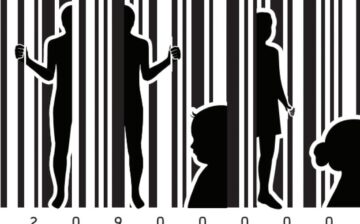Sign up for our news digest
I agree to receive email updates from Human Trafficking Search. I may unsubscribe at any time.
Sex Trafficking

Where the Crossroads of Abuse Meet: Domestic Violence and Trafficking
In light of Domestic Violence Awareness Month, it is only fitting to talk about the stark connection between domestic violence and human trafficking. While seemingly two separate issues, domestic violence and trafficking are intertwined more often than not.

Expanding Legal Options for Foreign National Trafficking Victims
Both U.S. Citizens and Foreign Nationals can be victims of human trafficking in the United States. Foreign National victims of human trafficking may sometimes be living within the United States in an undocumented immigration status. To address the particular vulnerabilities of these victims, the Trafficking and Victims Protection Act creates certain immigration protections for foreign national trafficking victims so that they remain legally within the United States.
Refugees and Trafficking: A Dangerous Nexus
The current crisis of Syrian refugees migrating to bordering states and Europe has commanded the attention of the media. From images of 3-year-old Aylan dead on the shores of Turkey to the tables of the European Commission, this issue has become global. However, seldom discussed is the stark connection between trafficking and refugees.
Pope Francis and Human Trafficking
This week, Pope Francis will be visiting the United States and touring Washington D.C., Philadelphia, and New York City. During his time here Pope Francis will be addressing Congress and the United Nations General Assembly. There has been much speculation about what the Pope will say in these remarks and during this trip. Despite the uncertainty about his exact remarks, one thing is for sure: this Pope has dedicated more attention to the discussion of human trafficking than any other Pope or world religious leader before him.
Anti-Trafficking Activists Fight Against Backpage.com
Last week, anti-trafficking advocates fighting Backpage.com, the classified advertising website that has been accused of facilitating commercial sexual exploitation of children, gained a hard-fought legal victory. In Washington State, the state Supreme Court ruled in a 6-3 decision that Backpage could be held accountable for commercial sexual exploitation in the case of three girls sold on the site. The girls, who were 13 and 15 when they were sold for sex online, will have their claim for damages against Backpage.com move forward in a court of law.
Improving State Trafficking Laws
The Trafficking and Victims Protection Act (“TVPA”) and its subsequent reauthorizations provide the United States government with the federal framework to regulate anti-trafficking policy and trafficking victim service provisions. However, there are also state laws in place to address human trafficking. Currently all 50 states have laws criminalizing human trafficking. Yet this is a new development, because as recently as 2004, only four states had human trafficking laws. The tipping point came in 2011-2012 when 28 states passed human trafficking laws. While all states now have anti-trafficking laws, some states nominally address labor trafficking and still others prioritize sex trafficking of minors and as such need to be augmented.
Controversy Surrounding the U.S. Trafficking Report
On July 27th, the United States Department of State issued the 2015 Trafficking in Persons (TIP) Report. This year’s TIP Report has received pushback for upgrading certain countries with poor human trafficking records, under the suspicion that the upgrades were based on political considerations instead of evaluating the countries on anti-trafficking prevention criteria. The upgrades of Malaysia and Cuba within the TIP Report have garnered particular criticism.
The Intersection of Human Trafficking & Forced Displacement
Today, the number of forcibly displaced people worldwide has reached nearly 60 million, the highest number since World War II. Almost 20 million of these are refugees: people who have fled their country of origin because of persecution based on their race, religion, nationality, political opinion, or membership in a particular social group. Close to 40 million are people displaced within their own country, known as internally displaced persons (IDPs). The Office of the UN High Commissioner for Refugees (UNHCR) – also known as the UN Refugee Agency – protects and assists both refugees and IDPs in over 125 countries. UNHCR also works on behalf of stateless individuals, who are not recognized as citizens of any State.
Why the Migrant Crisis in the Mediterranean is Not Human Trafficking
In the mass media coverage about Europe’s migrant crisis, in which an estimated 1,850 people have lost their lives so far this year crossing the Mediterranean, fingers have been pointed at “traffickers”, accused both of amplifying both the scale of the migration flow and being responsible for the most devastating of the humanitarian consequences of the trade. This is a conceptual error.
The Department of State’s Trafficking in Persons Report- What is it and Why Is it Important?
Soon, the United States Department of State will issue the 2015 Trafficking in Persons (TIP) Report. The TIP Report is the …
